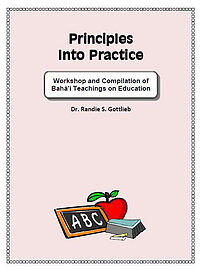The Baha’i Faith, a global religion founded in the 19th century, presents a unique tapestry of teachings and principles that advocate for the advancement of knowledge, unity, and justice. Its doctrines encourage adherents to cultivate spiritual growth, social transformation, and personal development. This article endeavors to elucidate the practical application of Baha’i teachings in everyday life, serving as a comprehensive guide for individuals seeking to integrate these ideals into their daily practices.
1. The Foundation of Baha’i Teachings
At the core of Baha’i teachings lies the principle of the oneness of humanity. This tenet asserts that all individuals, irrespective of their backgrounds or beliefs, are part of a singular human family. This universality transcends cultural, racial, and national boundaries. Understanding this unity facilitates a broader perspective on human interactions, engendering tolerance, empathy, and collaborative efforts towards peace.
2. Spiritual Practices: Cultivating an Inner Life
The Baha’i Faith emphasizes the significance of personal spiritual practices as a conduit for growth. Daily prayer and meditation are foundational activities that encourage connection with the Divine. The act of supplication enhances one’s awareness of spiritual realities, fostering a sense of gratitude and deepening a relationship with God. Baha’is are encouraged to engage with the Sacred Writings, nurturing a reflective and thoughtful approach to faith. This regular engagement with scripture not only cultivates spiritual insight but also fortifies the moral compass that guides a Baha’i’s actions.
3. Ethical Living: A Framework for Daily Conduct
The Baha’i principles outline a distinct moral framework that serves to guide adherents in their interactions with others. Honesty, integrity, and service are central virtues. In practical terms, this might manifest as volunteering within one’s community, advocating for social justice, or simply striving to act with fairness in personal and professional relationships. Practical ethics extend to an emphasis on the transformative power of kindness, illustrating that small acts of goodwill can lead to significant societal change.
4. Education: The Key to Empowerment
The promotion of education is paramount within Baha’i teachings. Education is viewed not merely as a practical endeavor but as a spiritual obligation. Access to knowledge is considered a right for all, and the Baha’i community actively seeks to provide educational opportunities for both children and adults. This commitment to education encompasses the moral and intellectual development of individuals. Baha’is are urged to pursue lifelong learning and to foster educational environments that encourage critical thinking, creativity, and the pursuit of truth.
5. Community Building: The Power of Collective Action
Baha’i teachings advocate for the establishment of vibrant and inclusive communities. The Baha’i community model encourages collective decision-making and participation, emphasizing the importance of consultation. This collaborative approach brings diverse perspectives into dialogue, enhancing communal harmony and responsiveness. Community engagement often includes hosting events, facilitating discussions on pertinent social issues, and providing platforms for artistic and cultural expression.
6. The Role of Service: A Pathway to Fulfillment
Service to humanity is a hallmark of Baha’i practice. Adherents are inspired to channel their talents and resources towards actions that benefit the wider world. This can take many forms, from local initiatives addressing specific community needs to international projects aimed at alleviating poverty and promoting development. Such service cultivates a sense of purpose and fulfillment, cementing the notion that true happiness is found in contributing to the well-being of others.
7. Gender Equality: A Pillar of Progress
Central to Baha’i teachings is the principle of gender equality, which posits that men and women have equal rights and opportunities. This revolutionary ideal asserts that the advancement of society is contingent upon the empowerment of women. In practice, Baha’is champion initiatives that promote equitable access to education, leadership opportunities, and participation in decision-making processes. This commitment fosters a culture of respect and cooperation, contributing to the broader vision of a just and harmonious world.
8. The Environment: Stewardship of the Earth
The Baha’i Faith embraces the concept of environmental stewardship, recognizing the delicate balance between humanity and the natural world. Baha’is are urged to foster sustainable practices and advocate for policies that protect the environment. This includes promoting conservation, participating in community clean-up efforts, and raising awareness about the ecological crises facing the planet. The teachings emphasize that caring for the Earth is a moral responsibility, integral to human development and survival.
9. Social Action: Engaging with Global Challenges
The Baha’i community actively engages with global challenges through social action initiatives. This involves addressing issues such as poverty, inequality, and discrimination. Baha’is are encouraged to work with diverse groups and organizations to find solutions that are just and equitable. This collaborative spirit reflects the larger Baha’i commitment to the advancement of civilization, leading to meaningful local and global change.
10. Conclusion: A Journey of Transformation
Living the Baha’i teachings is not merely an adherence to a set of beliefs but a transformative journey that encompasses spiritual growth, ethical conduct, and dedicated service to humanity. By integrating these principles into everyday life, individuals not only enrich their own existence but also contribute to a more harmonious and just world. The application of these teachings is a continual process, prompting Baha’is to strive for personal and collective betterment, all while embracing a profound sense of unity with humankind.
